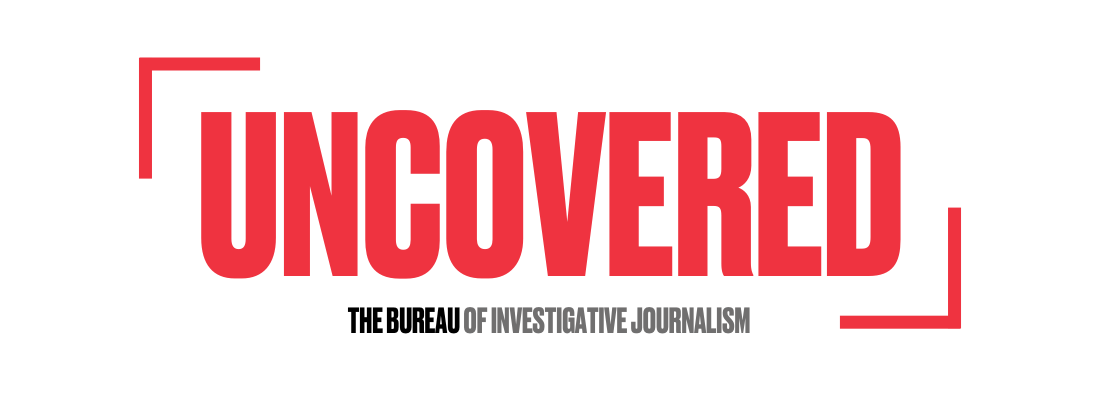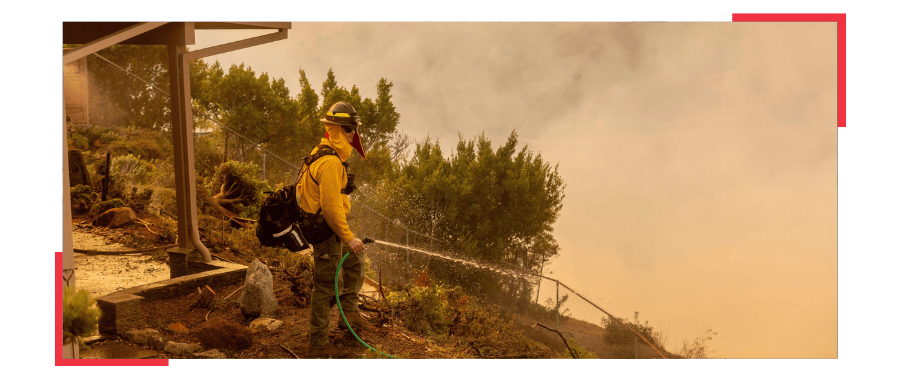
“By making climate change worse, they’re increasing insurance costs and making things more risky, which ironically hurts their business line.”
Hi {{ First name | there }},
Earlier this year, hundreds of people in the US lost their lives – and thousands lost their homes – to the fires and floods that ravaged the country. As well as seeing their communities swept away or up in smoke, many of the survivors also didn’t have any insurance to protect them.
Chubb, one of the world’s largest insurers, cut insurance cover in wildfire-prone areas of California in 2021. The rise in wildfires and other natural disasters is one of the many scary aspects of the climate crisis. Insurance companies know that there are more and more areas that just aren’t insurable, because the risk of a catastrophe has become far too high.
Knowing that our use of fossil fuels is a key cause of the climate crisis, Chubb stopped insuring coal projects in 2019. The company’s policy dictates that it will not insure companies generating more than 30% of their energy from coal. Other insurers followed suit with similar commitments.
But we can reveal that Chubb seems to have ditched this commitment, becoming the lead insurer on a Vietnamese coal project. Just last week it reinsured a 1.2GW power plant on Vietnam’s coast fuelled entirely by coal. Last time I checked, 100% was more than 30%.
Estimates suggest the plant could emit up to 175m tonnes of CO2 in 25 years. For scale, that’s more than the annual emissions of the Philippines.
We spoke to shareholders in Chubb, including Giovanna Eichner, at Green Century Capital Management. She told us: “It’s absurd for Chubb to continue to underwrite activities that are causing climate change and then turn around and pay for the claims and payouts caused by these activities.”
Certainly, Chubb’s CEO has changed his tune.
TBIJ has been tracking the major corporations backsliding on their green commitments – we called out HSBC last week. Financial institutions like banks and insurers are more important than most. Without their money, none of the dirty businesses pushing us closer to the brink would be able to operate.
The thing to watch now is how shareholders deal with this. Some are speaking up and trying to pressure big business to act responsibly. We’ll keep giving them the information they need to hold the bosses to account.
Our community of supporters are dedicated to helping us expose stories like this one. They’re curious people who believe in making sure everyone understands the injustice around them. If that sounds like you too, then join us today:
Factchecked!
Each week we reveal a fascinating fact from our reporting…
Did you know?
In chemotherapy drugs, the active ingredient – which fights cancer cells – is also highly toxic. Patients need to receive enough of it to treat the cancer but not so much that they overdose and suffer damaging side effects.
Find out more
Researchers of a landmark study told TBIJ that some chemotherapy drugs shipped to sub-Saharan Africa contained so little of their key ingredient that pharmacists said giving them to patients would be as good as doing nothing.
Other drugs, containing too much active ingredient, put patients at risk of severe organ damage or even death.
When will the last journalist die in Gaza?
Israel has added a new dimension to its onslaught on Palestinians: starvation. Desperate civilians are entering giant pens in the vain hope they might get food. Instead, they are shot by Israeli soldiers – more than 1,000 have been killed in this way since May, according to the UN.
Doctors treating the injured are fainting, because they, too, are too weak to continue.
One of the many terrible facets to Israel’s merciless siege on Gaza has been barring international journalists from entering. Palestinian reporters have tirelessly continued, sharing the photographs, videos and stories that have kept us informed of the horrors of the attacks. Israeli forces have killed around 200 of them.
“I no longer have the strength to work for the media,” Bashar, who has worked for AFP press agency for 15 years, said. “My body is thin and I can’t work anymore.” AFP stated: “We refuse to watch them die.”
The BBC, Reuters and AP joined AFP in a statement this week: “For many months, these independent journalists have been the world’s eyes and ears on the ground in Gaza. They are now facing the same dire circumstances as those they are covering. We are deeply alarmed that the threat of starvation is now one of them.”
What happens when the last journalist in Gaza is gone? Will Palestinians continue to be killed – only now, with even fewer eyes to witness the horror?
Inside the AI arms business lobbying the UK
There are 300 autonomous surveillance towers dotted along the US’s southern border. They form part of the country’s controversial efforts to bolster its border security, as Trump’s America becomes more determined to keep migrants out.
Anduril, the company that made the towers, proudly announced that the model “autonomously provides operators with the real-time intelligence they need to detect, identify, and track objects of interest, saving manpower and cost spent on manual surveillance, while keeping operators out of harm’s way”.
Anduril is just eight years old but – backed by billionaire Peter Thiel – it has grown into a $30bn company, selling its AI-led approach to weapons. The pioneering spirit is in the company’s blood. When he was just 19, co-founder Palmer Luckey founded the advanced virtual reality headset company Oculus VR.
Our investigation reveals how Anduril is coming to the UK in a big way. It already has a few contracts with the UK government, including supplying its AI-powered sentry towers (recently mapped by Migrants’ Rights Network), reportedly to monitor migrants crossing the Channel.
This is just the beginning. The extensive lobbying campaign we uncovered suggests we could soon be seeing a lot more of Anduril in the UK. Our reporters burrowed into how Anduril is inveigling itself into the British establishment.
The problem is we know very little about the tech. AI is still a very new field and many people, including in government, don’t fully understand it. Even the people designing it often don’t fully understand what could go wrong. When one mistake could lead to people dying, the prospect becomes pretty scary.
Subscribe to New Internationalist for just £1
We are living in a critical moment for truth, justice and democracy.
From fascists in the streets to heads of state, the far right is gaining power and getting organised across borders.
But we know that if we work together, a better world is possible. That's why New Internationalist's upcoming magazine is dedicated to exposing the global far right and giving readers the tools to fight back.
Issue out soon!
What we’ve been reading
🔴 The way chemotherapy cured a mother’s mental illness could transform how we understand and treat schizophrenia: newyorker.com
🔴 A fascinating account of how survivors brought down the the Jesus Fellowship cult they were raised in: theguardian.com
🔴 Why does a property company run by a billionaire keep letting shops in the heart of London to tenants that vanish?: londoncentric.media
Thanks,
Franz
Franz Wild
Editor

ADVERTISEMENT
The Briefing Leaders Rely On.
In a landscape flooded with hype and surface-level reporting, The Daily Upside delivers what business leaders actually need: clear, concise, and actionable intelligence on markets, strategy, and business innovation.
Founded by former bankers and veteran business journalists, it's built for decision-makers — not spectators. From macroeconomic shifts to sector-specific trends, The Daily Upside helps executives stay ahead of what’s shaping their industries.
That’s why over 1 million readers, including C-suite executives and senior decision-makers, start their day with it.
No noise. No jargon. Just business insight that drives results.





